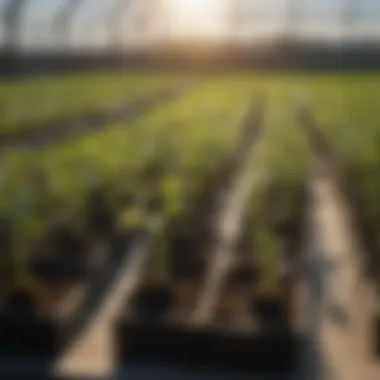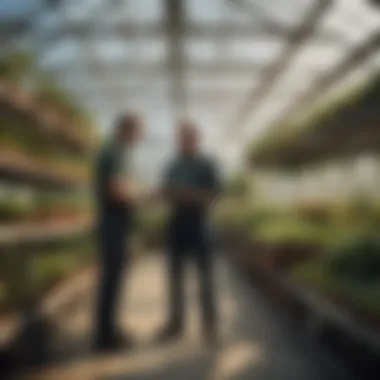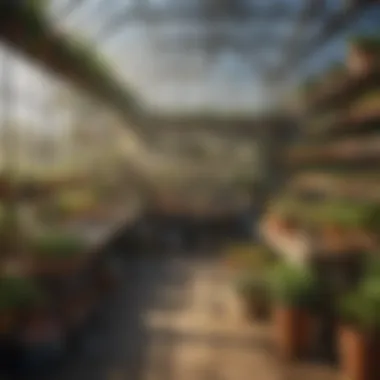Discover Local Greenhouse Retailers: Your Guide


Intro
In the realm of agriculture and horticulture, greenhouse retailers play a vital role in providing plants, supplies, and knowledge. Their services and products are essential for anyone looking to enhance their gardening experience or agricultural practices. This guide aims to help readers navigate the landscape of local greenhouse retailers effectively. The focus is on how to find reliable retailers, evaluate their offerings, and make informed purchasing decisions. Engaging with greenhouse retailers can significantly impact the success of gardening endeavors, particularly for those who are new to the field.
Latest Trends in Agriculture
Overview of Current Trends
The agricultural sector is currently witnessing numerous trends that reshape how we approach gardening and farming. Interest in local sourcing has grown, encouraging gardeners to support nearby retailers. This trend enhances community connections and reduces the carbon footprint associated with transporting plants and supplies over long distances. Furthermore, organic gardening methods have gained popularity. Many consumers are now more aware of the benefits of organic produce, which drives the demand for organic seeds and soil amendments.
Impact of Technology on Farming Practices
Technology also plays an influential role in modern agriculture. Advances in hydroponics and aquaponics allow growers to produce crops in controlled environments, maximizing yield while minimizing resource usage. Additionally, smart gardening tools, such as automated watering systems and soil sensors, enable gardeners to make data-driven decisions about their plants’ needs. These innovations provide valuable opportunities for both hobbyists and commercial growers, enhancing productivity and sustainability.
Sustainable Practices: Towards a Greener Future
Importance of Sustainability in Agriculture
The pressing need to address environmental issues has led to a greater emphasis on sustainable practices in agriculture. Sustainability is crucial for ensuring that natural resources are preserved for future generations. Local greenhouse retailers often promote sustainable products, such as native plants and organic gardening supplies. By engaging with these retailers, gardeners not only benefit their own practices but also contribute to a larger movement towards environmental stewardship.
Methods for Sustainable Farming
Implementing sustainable farming techniques can take various forms. Here are some effective methods:
- Crop rotation: Helps prevent soil depletion and reduces pest populations.
- Companion planting: Utilizes mutually beneficial plants to promote growth and deter pests.
- Organic pest control: Incorporates natural methods to manage pest populations without harmful chemicals.
Gardening Techniques and Tips
Essential Gardening Tools and Equipment
Having the right tools is crucial for successful gardening. Some essential tools include:
- Trowel: For digging and planting.
- Pruning shears: For maintaining plant health.
- Garden fork: For aerating and turning soil.
Investing in quality tools can make a substantial difference in the gardening experience. Local greenhouse retailers often stock a variety of equipment suitable for different gardening styles.
Seasonal Gardening Practices
Gardening is cyclical, aligning with seasonal changes. Knowing what to plant and when is vital. Spring is a prime time for sowing seeds and planting annuals. In summer, maintaining moisture and weeds becomes essential. Autumn is ideal for planting perennials and preparing for winter. Lastly, winter can be a time for planning and organizing the next growing season.
"Gardening is not just about plants; it's about understanding the rhythm of nature and working with it for sustainable outcomes."
By understanding these trends, sustainable practices, and techniques, gardeners can make informed decisions when selecting local greenhouse retailers. Doing so will enhance their gardening practices and contribute positively to their communities.
Understanding the Role of Greenhouse Retailers
Greenhouse retailers serve a fundamental function in the landscape of agriculture and horticulture. Their significance cannot be overstated, as they are crucial for providing plants, supplies, and knowledge to enthusiasts and professionals alike. The role they play goes beyond just selling products; they are often the first point of contact for many individuals looking to engage in gardening or farming.
Defining Greenhouse Retailers
Greenhouse retailers are specialized shops that sell plants, gardening supplies, and equipment tailored for greenhouse environments. Unlike general garden centers, these retailers often focus on products specifically designed for controlled growing conditions.
They typically offer a selection of:
- Flora: This includes various plant species, from annuals to perennials, as well as vegetable plants and herbs suitable for greenhouse growth.
- Soils and Nutrients: Essential for plant health, these retailers provide an array of soil mixes and fertilizers tailored for greenhouse use.
- Tools: From basic hand tools to more complex systems, they supply items critical for maintaining a greenhouse effectively.
- Pest Management Solutions: They also stock eco-friendly pesticides and integrated pest management tools, which are vital for maintaining plant health.


Importance in Agriculture and Horticulture
The importance of greenhouse retailers extends into various areas of agriculture and horticulture, fostering both local economies and community engagement. Precisely, they provide:
- Access to Knowledge and Expertise: Many greenhouse retailers have personnel who possess extensive knowledge about plants and horticultural practices. They can offer tailored advice that helps customers make better decisions.
- Community Building: These retailers often foster local communities through workshops and events, creating spaces where enthusiasts can share experiences and grow in their knowledge.
- Sustainable Practices: Many greenhouse retailers advocate for sustainable agriculture techniques, promoting eco-friendly products and practices to their customers. This contribution is vital in today’s context of environmental awareness.
"Greenhouse retailers do not merely sell products; they cultivate communities and foster sustainable practices that can transform lives."
The role of greenhouse retailers is thus multi-faceted. They bridge the gap between suppliers and end-users while promoting sustainability and community growth.
Identifying Greenhouse Retailers Near You
Identifying local greenhouse retailers is crucial for both novice and experienced gardeners. Knowing where to shop allows flexibility in acquiring necessary products and fosters a connections with the local community. The proximity of these retailers can lead to better service and more personalized advice. Accessing proper resources ensures you have what you need to cultivate your gardening passions effectively.
Utilizing Online Search Tools
In the digital age, online search tools serve as the first point of contact for many consumers. Websites like Google Maps or Yelp can provide a wealth of information about greenhouse retailers in your area. You can view customer reviews, compare product offerings, and check for current promotions. Searching specific terms such as "greenhouse retailers near me" can yield a list of options tailored to your location. This method often proves efficient, helping you narrow down choices based on distance, rating, and services offered. Many retailers also maintain an online presence, displaying products and specials, enhancing your research efforts.
Leveraging Local Directories
Local directories are another excellent resource when seeking greenhouse retailers. Websites like Yellow Pages or local chambers of commerce offer listings categorized by type and location. These platforms can lead you to smaller, family-owned businesses that might not have a strong online footprint. When using local directories, consider calling to confirm product availability or to inquire about their specific offerings. This proactive approach fosters relationships with retailers and ensures you are informed about the best options in your community.
Engaging with Community Resources
Community resources play a vital role in connecting you to greenhouse retailers. Local gardening clubs or agricultural extension offices often provide insights on where to shop. Engaging with these organizations can also lead to valuable recommendations tailored to your specific interests or needs in gardening. Attending local farmers' markets or workshops can further expose you to greenhouse retailers and allow you to see their products firsthand. Participating in such events can foster a sense of community, helping you discover valuable connections that enhance your gardening experience.
Finding the right greenhouse retailer is not just about proximity; it’s about finding the right fit for your gardening needs.
Evaluating Greenhouse Retailers
When engaging with local greenhouse retailers, evaluation becomes a key process that significantly shapes your gardening experience. Assessing various greenhouse retailers is essential because it allows you to make informed decisions. Knowing what features to look for can enhance the quality of your plants and gardening results. Additionally, it helps you establish a connection with a retailer who aligns with your specific needs and goals.
Product Variety and Quality
The assortment of products offered by a greenhouse retailer can vary greatly. A diverse range can include seeds, plants, soils, and tools that cater to different gardening needs. This variety is crucial as it allows you to explore options that suit your gardening style and expertise.
Furthermore, the quality of these products matters immensely. Healthy plants and high-grade seeds will yield better results in your garden. To assess quality, observe the plants' condition when visiting the store. Look for vibrant colors, absence of pests, and overall health. Quality soils and fertilizers should be sealed and well-branded, indicating industry standards. Always inquire about product sourcing and check if they carry brands known for their quality, such as Miracle-Gro or FoxFarm.
Customer Service and Expertise
Customer service is a significant factor in evaluating greenhouse retailers. Attentive staff can guide you toward the right products and answer your questions knowledgeably. A helpful retailer often employs experts with horticultural experience, which can be invaluable to both new and seasoned gardeners.
Engagement with customers shows commitment to service. Ask potential retailers about gardening tips or specific product recommendations. A retailer willing to share their expertise is likely invested in their customers' success. This relationship is crucial, as ongoing support can lead to improved gardening practices and satisfaction.
Pricing and Value Assessment
Pricing can be a decisive aspect of your evaluation process. While lower prices may seem attractive, they often indicate lower quality. Thus, value assessment requires a balance between cost and benefits. Compare prices between different retailers for similar products while considering the quality.
Discounts and loyalty programs can offer additional value. Retailers like Home Depot or Lowe's may have occasional sales and rewards programs that benefit regular customers. Don't hesitate to discuss pricing openly with retailers; understanding their pricing structure can help you feel confident in your purchases.
Always remain mindful that investing in quality often saves money in the long run. In this way, prioritizing value over price helps ensure that you make judicious selections that improve your gardening success.
Types of Greenhouse Products
Understanding the various types of greenhouse products is vital for both novice and experienced growers. Selecting the right products can significantly impact plant health, yield, and sustainability. This section dives into three major categories: seed selection, soils and nutrients, and tools and equipment. By comprehending each category's significance, gardeners can make informed decisions tailored to their specific needs, enhancing both their experience and success in horticulture.
Seed Selection


Choosing the right seeds is a foundational step in any gardening or agricultural endeavor. The seed you select will determine not only what crops you can grow, but also the overall health and vigor of your plants. Here are some considerations for seed selection:
- Varietal differences: Not all seeds are created equal. Different varieties can have unique traits such as disease resistance, yield potential, or environmental adaptability. Research is crucial to understand which varieties perform best in your local climate.
- Germination rates: A seed's germination rate indicates how many will sprout from a given batch. High germination rates are essential for maximizing your gardening efforts. Choose seeds from reputable suppliers who provide this information.
- Organic vs. Conventional: For those concerned about chemical use, selecting organic seeds can be a priority. Organic seeds are non-GMO and cultivated without synthetic pesticides or fertilizers. Keep in mind the implications this might have for pest management and crop resilience.
Soils and Nutrients
Quality soil is key to successful plant growth. The right mix of nutrients supports plants during different growth stages. Here are some factors to consider when selecting soil and nutrients:
- Soil types: Understanding your base soil is essential. Different plants have varying preferences for soil texture and drainage. For instance, succulents thrive in sandy soils while many vegetables prefer loamy mixtures. It's advisable to test your soil pH and nutrient levels to identify deficiencies.
- Nutrient supplements: Organic compost and commercial fertilizers can enhance soil nutrient content. Familiarize yourself with the N-P-K ratio (Nitrogen, Phosphorus, Potassium) of fertilizers to align them with plant needs.
- Biodegradable options: Some retailers offer soil amendments that are fully biodegradable, supporting sustainable gardening practices. These options can help improve soil health over time without introducing synthetic additives.
Tools and Equipment
Access to proper tools is critical for effective greenhouse management. The right equipment facilitates both routine maintenance and specialized tasks. Consider the following:
- Essential tools: Hand tools like trowels, pruners, and watering cans are necessary for day-to-day gardening activities. Harvesting tools, such as shears, should also be on your inventory list.
- Specialty equipment: Depending on your ambitions, you may require more advanced tools like irrigation systems, climate control devices, or hydroponic setups. Ensure these tools are compatible with your greenhouse structure and plant types.
- Maintenance of tools: Invest in quality tools and prioritize their care. Proper maintenance will extend their utility and reliability while decreasing the likelihood of issues during crucial periods of growth.
Sustainable Practices in Greenhouse Retailing
Sustainable practices in greenhouse retailing play a vital role in both environmental stewardship and economic viability. As consumers become increasingly aware of ecological impacts, retailers must adapt by integrating sustainability into their operations. This involves selecting eco-friendly products, using resources efficiently, and minimizing waste. By supporting sustainable practices, both consumers and retailers contribute to healthier ecosystems and improve the overall quality of agricultural products.
Organic and Eco-Friendly Options
Organic and eco-friendly options have gained significant popularity among gardening enthusiasts. These products typically follow strict guidelines that prohibit synthetic chemicals and fertilizers. As a result, organic options are often better for both humans and the environment. Purchasers of organic seeds, plants, and fertilizers help maintain biodiversity while reducing pollutants.
When selecting organic products, consider the certification labels. Certifications like USDA Organic indicate that the products meet rigorous standards for organic farming. Furthermore, retailers that specialize in organic offerings often provide detailed information on their sourcing practices. This transparency allows you to make more informed decisions about your purchases.
Water Conservation Techniques
Water conservation is another critical aspect of sustainable greenhouse practices. Retailers are adopting various techniques to reduce water usage while maintaining plant health. Techniques like drip irrigation and rainwater harvesting systems are becoming standard.
Drip irrigation delivers water directly to the roots of plants, minimizing evaporation and runoff. On the other hand, rainwater harvesting captures natural precipitation for future use, decreasing reliance on municipal water sources. If you are shopping at a local retailer, inquire about available water conservation products or advice on implementing these techniques at home.
"Implementing effective water conservation techniques not only benefits the environment but can also lead to cost savings for consumers."
Pest Management Solutions
Pest management is a crucial area where sustainable practices can have a significant impact. Integrated pest management (IPM) focuses on long-term prevention through a combination of techniques. These techniques include cultural practices, biological control, and, when necessary, minimal use of chemical pesticides.
Retailers that offer sustainable pest management solutions usually emphasize natural alternatives. Solutions may include introducing beneficial insects, like ladybugs, to control harmful pest populations. Additionally, products containing natural insecticides derived from plants can be effective without posing the same risks as synthetic options.
By choosing retailers that prioritize sustainable pest management, you contribute to a healthier environment and promote a more balanced ecosystem.
Creating a Relationship with Your Local Retailer
Establishing a connection with your local greenhouse retailer can significantly impact your gardening experience. It entails more than just a transactional relationship; it is about partnership and understanding. This guide emphasizes how nurturing this relationship can lead to better results in your gardening or agricultural endeavors.
This relationship can provide unique advantages. A local retailer not only understands the community's climate but also the specific needs of its customers. They can offer tailored advice to help you succeed, such as suggesting the right plants or the best soil types for your local conditions. Furthermore, building a relationship encourages loyalty. When you trust your retailer, you are more likely to return for future purchases and recommendations.
Building Trust and Loyalty
The foundation of any relationship is trust. In the context of greenhouse retailing, trust can lead to a mutually beneficial scenario. Customers benefit from personalized recommendations while retailers gain a loyal clientele. Trust is built over time. It may start with simple interactions during transactions but can develop into a deeper understanding of your gardening needs.
To establish trust, start by being open about your gardening challenges and goals. Ask questions and show your interest in understanding the products. Retailers appreciate customers who engage in meaningful conversations about their gardening practices. This helps the retailer provide insights that are more relevant to you.
In addition, now many retailers offer loyalty programs or benefits for regular customers. Engaging with these programs can further build your connection with the retailer. Over time, as you consistently return, your trust and loyalty will grow, leading to a more fruitful partnership.


Participating in Local Events and Workshops
Engagement with local events and workshops is an excellent way to strengthen your relationship with greenhouse retailers. These gatherings provide opportunities for hands-on learning and direct interaction with both the retailer and fellow gardening enthusiasts.
When you attend events such as plant fairs, workshops on sustainable gardening, or seasonal planting events, you not only gain knowledge but also build community ties. Retailers often showcase new products or techniques at these events, and engaging in discussions can provide further insight into their offerings.
Moreover, these experiences promote loyalty and trustworthiness. When you participate in these events, you demonstrate commitment to your local retailer and the community. You can also learn from others' experiences, sharing valuable tips and tricks that can benefit your gardening practices.
"Building a strong relationship with your local retailer can change the way you garden, offering insights tailored to your specific needs."
Overall, fostering this connection creates a supportive environment that enhances the knowledge-sharing experience. This results in better gardening outcomes, making it worthwhile to invest time in developing these relationships.
Challenges in Finding the Right Retailer
Finding the right greenhouse retailer can be a daunting task. The vast array of options available may lead to confusion, and various challenges may arise during the selection process. Understanding these challenges is important for individuals aiming to enhance their gardening or agricultural practices. This section outlines the prevalent challenges one might face and provides insights into navigating them effectively.
Limited Inventory Issues
One common hurdle is limited inventory at local retailers. Not every store carries a comprehensive range of products. This situation can be frustrating for both novice and experienced gardeners. It necessitates careful consideration of one’s specific needs and the types of plants or supplies desired.
When a local greenhouse does not have the required seeds or tools, gardeners may need to visit multiple retailers, which consumes time and effort. In some cases, it may even lead to compromising on quality. To mitigate these issues, consider the following tips:
- Ask for Recommendations: Engage with local gardening communities or forums, such as those on Reddit, to get insights about which stores offer better inventory.
- Call Ahead: Before visiting a store, call and ask about the availability of specific products. This simple act can save you a lot of time.
- Check Online: Many retailers now have online catalogs. Browsing these can give you an idea of what to expect when you visit in person.
Quality vs. Price Dilemma
Another significant challenge is balancing the quality of products against their price. Gardeners often face the temptation to choose cheaper options to save money. However, lower prices can sometimes mean lower quality, which may not provide the best results in the garden.
To navigate this dilemma, consider these factors:
- Evaluate Your Budget: Determine how much you are willing to invest in your gardening journey. This step will help narrow down the choices.
- Research and Reviews: Always look for reviews of the products and retailers. Engaging with platforms like Facebook or gardening forums can provide valuable insights into product performance.
- Prioritize Essentials: Focus on investing more in critical components like seeds or soil, which can significantly influence your garden's success. Evaluate lesser purchases more cautiously.
As you weigh your options, remember that quality supplies often contribute to a more fruitful gardening experience. Investing wisely in dependable products will yield better long-term results.
"Investing in quality gardening supplies today can lead to healthier plants tomorrow."
Understanding these challenges is key to improving your gardening skills. By being aware of inventory constraints and weighing the costs of quality, you can make informed decisions that enhance your gardening endeavors.
The Future of Greenhouse Retailing
The landscape of greenhouse retailing is undergoing significant transformation. Understanding the future of this sector is crucial for stakeholders in agriculture and horticulture. As consumers become more aware of sustainability and efficiency, greenhouse retailers must adapt. This evolution is not only about meeting demands but also about enhancing operational practices and establishing effective systems. The next few years will see retailers who embrace changes and innovatons thrive.
Emerging Trends in Horticulture
Horticulture is evolving rapidly, with trends that reflect changing consumer preferences and environmental considerations. One major trend is the increasing demand for organic products. Consumers are paying more attention to where their food comes from and how it is produced. This shift encourages retailers to stock organic seeds, fertilizers, and plants.
Furthermore, there is a notable rise in urban gardening. As urban areas expand, more people seek ways to cultivate their own food in limited spaces. Greenhouse retailers are catering to this demand with products suited for small-scale gardening, such as vertical gardens and container gardening solutions.
Another crucial aspect is the trend towards sustainability. Retailers are now focusing on eco-friendly products and practices. This involves using recyclable materials for packaging and promoting water-saving irrigation systems.
Other emerging trends include:
- Technological Integration: The use of apps and software to help gardeners manage their plants efficiently.
- Community Engagement: Retailers are hosting workshops and events to foster community spirit and educate gardening enthusiasts.
Technological Innovations in Retail
Technology plays a pivotal role in reshaping greenhouse retailing. The integration of digital tools streamlines both shopping experiences and operational efficiencies. For instance, point-of-sale systems that offer inventory tracking can assist retailers in maintaining optimal stock levels. This ensures that popular products are always available for customers.
Online platforms are also becoming essential. Many retailers now offer e-commerce options, enabling consumers to purchase products from the comfort of their homes. This trend aligns with the growing preference for online shopping and has become particularly relevant during recent years.
Innovations such as augmented reality have made their way into the horticulture arena as well. Customers can visualize how products will look in their homes or gardens before making a purchase, enhancing satisfaction.
Furthermore, data analytics allows retailers to understand customer behavior better. By analyzing purchasing patterns, retailers can tailor their offerings more effectively, ultimately boosting sales and customer satisfaction.







